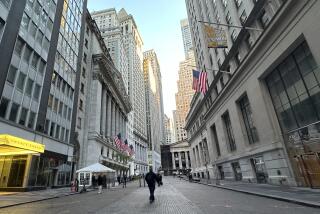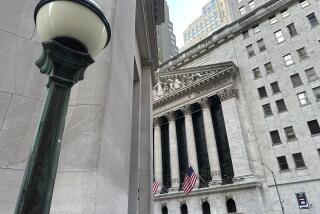FINANCIAL MARKETS : Upbeat News on Economy Batters Bonds
The Treasury bond market had its worst day in nine months Thursday when new signs of economic strength dashed expectations that the Federal Reserve Board would cut interest rates soon. Stocks, however, survived relatively intact.
The bond market rout was set off by a Commerce Department report that new-home sales shot up nearly 20% in May, the biggest gain in more than three years. Many analysts had expected a slight decline.
The yield on the Treasury’s benchmark 30-year bond surged to 6.64% from 6.51% on Wednesday. Its price, which moves in the opposite direction, dropped by 1 27/32 points, or $18.44 per $1,000 in face value. It was the biggest daily price decline since May of last year, when there was a drop of more than two points.
Traders who had been assuming that Fed policy makers would be cutting short-term interest to bolster an economy that needed it quickly changed their tune.
To economists, the new-home sales figures are likely to mean more demand for carpeting, appliances, furnishings and other goods to fill those homes.
The housing data added to what had already been a negative outlook. The bad mood started with news of an earlier report that new claims for unemployment benefits unexpectedly fell by 28,000 last week. It was the biggest decline in nearly a year, and is also signal that the economy may not be as bad off as economists had thought.
Yields on three-month Treasury bills rose sharply too, rising to 5.64% as the discount rose 0.10 percentage point to 5.48%. Six-month yields rose to 5.63% as the discount rose 0.10 point to 5.40%.
Despite the bond market’s plunge, the Dow Jones industrial average ended only 6.23 points lower at 4,550.56, having recouped nearly all of a 34-point drop posted earlier in the day.
“The [stock] market’s down because bonds have reversed heavily,” said Joseph Battipaglia, market strategist at the Sterling Advisers money management firm in New York. But given the ferocity of the bond market’s selloff, “stocks are not off significantly,” he said.
Declining issues led advancers by about 8 to 7 on the New York Stock Exchange. Big Board volume was moderate at 315.60 million shares, down from 368.06 million on Wednesday.
A host of forces kept stock losses at a minimum, among them a sharp recovery in technology issues and optimism surrounding Wednesday’s resolution of automotive trade conflicts with Japan.
In addition, Battipaglia said, inflation is not bothersome and interest rates, if they won’t be lowered soon, are at least not going higher.
Most broad-market indexes were lower, although the Nasdaq composite bucked the tide, rising 6.29 points to 926.81 on the strength of a comeback in technology issues.
Among Thursday’s highlights:
* Technology stocks rose strongly after having been on the defensive for the last few days. Microsoft was up 1 1/2 to 89 3/8, Micron rose 1 1/2 to 55 1/8, Compaq added 1 to 44 1/2 and Texas Instruments jumped 4 1/8 to 136 7/8. Intel rose 11/16 to 63 13/16, and IBM added 7/8 to end at 97.
Paradigm jumped 5 1/2 to 19 1/2 in the first day of trading for the semiconductor maker. Instent, also in an initial public offering, rose 1 1/4 to 14 1/4.
Rollins shed 2 1/2 to 23 3/4 after issuing an earnings warning for the second quarter. Parcplace tumbled 2 5/8 to 8 1/2 after forecasting a loss for the latest quarter.
* Retailer CompUSA rose 3 3/4 to 33 after reporting improved revenues for the quarter.
* Among cyclicals, Chevron led the Dow 30 industrials lower, falling 1 3/8 to 47.
* Minnesota Mining & Manufacturing was down 1 at 57 1/8; J.P. Morgan dropped 7/8 to 70 3/4, and Eastman Kodak gae up 3/4 at 60 1/8.
* Scott Paper rose 1 3/8 to 49 1/2 on rumors that Britain’s Unilever or Procter & Gamble may buy the company. Kimberly-Clark has been reported to be in takeover talks with Scott Paper. P&G; was off 3/8 at 72 1/4.
Overseas, Tokyo stocks closed down for a fourth consecutive day, with the Nikkei 225-share average shedding 110.90 points at 14,507.17, a 34-month closing low.
In Frankfurt, the 30-share DAX average ended up 10.11 points at 2,106.55, and London’s FTSE-100 average rose 11.3 points to 3,294.0.
Mexico’s Bolsa index closed up 9.85 points, at 2,183.53.
In other markets, energy futures prices fell Thursday on the New York Mercantile Exchange, led by a crude-oil selloff. Light sweet crude for delivery in August settled at $17.56 a barrel, down 41 cents.
Wheat prices hit their highest levels in years, as estimates of world stockpiles were revised downward and the U.S. crop--usually the mainstay for hungry importers--showing poor results this year.
Wheat on the Chicago Board of Trade for delivery in July closed 8.75 cents higher at $4.475 a bushel, after hitting contract highs of $4.52, the highest level for July contracts reached during the month of June since 1979.
More to Read
Inside the business of entertainment
The Wide Shot brings you news, analysis and insights on everything from streaming wars to production — and what it all means for the future.
You may occasionally receive promotional content from the Los Angeles Times.










